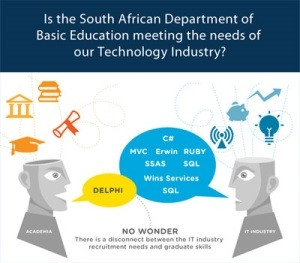
For the 30- to 40-year-olds of today, the choice of a second language to be taken in school was often between English, Afrikaans, Xhosa or Zulu. These days, where children are learning to use technology, such as iPads and iPhones, from the moment they can reach out and interact with it - it seems only logical that programming as a second language will be a necessity.
Primary school children in the United Kingdom from the age of five will be taught simple coding as part of the proposed new school curriculum, according to details released in July 2013. From age seven, children will learn computer-aided design, from 11 years old, 3D and mathematical modelling, in addition to using computer-aided manufacturing tools and including programmable components in design.
This approach is to ensure the children entering the school system today will be well equipped to take up jobs in the future, to support a strong technology industry in years to come - an essential requirement to compete on a global level, says Sarah Meder, Saratoga Staff Writer.
But how does South Africa compare with its blossoming technology industry? Are we taking the right steps to support growth of this industry from the bottom up?
Ctl + Alt + Del
In light of the recent uproar over the Department of Basic Education's decision to make Delphi, a programming language rarely used in business these days, the exclusive language taught to high school students, it seems there is a pressing need for the department to get in touch with what our local industry needs, and what global trends are currently driving innovation in technology. Wits University's Department of Education publicly responded, saying: "The DBE cannot send our country back to the Stone Age by doing away with Java and retaining an out-of-date programming language like Delphi." Concern, too, has been raised by the Chamber of Commerce.
While at face value it may seem understandable that the Department of Basic Education's main concern is that it wants to teach principles and not vocational skills; if we were to consider a "spoken language" equivalent of this, it would not be dissimilar to arguing that we should teach Latin instead of English as standard in schools - and as the old refrain goes, "Latin is a language, Dead as Dead Can Be".
Bridging the divide
In countries such as Denmark and Switzerland, which have consistently ranked highest in global innovation, we see a strong partnership between education and industry - helping ensure that education is meeting the needs of industry.
The current problem in South Africa is that computer science education and information technology is not taught as standard in schools (Ashley, 2012), and this is where we need to begin driving innovation.
According to Panyaza Lesufi, spokesperson for the Department of Basic Education, only 0.09% of grade 12 pupils studied IT as a subject. Other statistics show high school learners taking information technology in South Africa fell from 6 787 to 4 428 between 2008 and 2012, which is an alarming 34% decrease (Speckman, 2013).
These are frightening statistics for those who are working in our local technology industry. Many of our innovative technology companies are struggling to find the right candidates to fill posts, mainly due to the large gap between industry requirements and academia - a fact supported by the high level of unemployment among graduates.
Saratoga is a local technology and innovation company that places value in hiring candidates who have a high-level education even for entry-level positions. Mark Gebhardt, Operations Director and Head of Engineering at Saratoga, has first-hand experience with dealing with this issue. "Finding the right people is critical in our industry and a cornerstone of our success. The right attitude goes a long way, but in top-end, enterprise-scale software development and consulting, the right educational background is also essential. The critical thinking skills and familiarity with high levels of complexity that candidates obtain as part of their education are key differentiators that allow businesses like ours to offer truly exceptional solutions in an efficient and cost-effective manner."
Unicef reports that 78% of South African government schools do not have computers. In 2010, less than 30% of schools in the country and only 6% of classrooms had access to the Internet. It is obvious the vast impact this has on the number of candidates who have been exposed to basic computer literacy by the time they reach high school level.
Being the change
While the future of education may seem grim at the present time, there is hope. Many companies have taken things into their own hands in order to see the changes they'd like to see happening, instead of relying solely on government departments.
Saratoga has achieved a crucial educational milestone in its local community, by helping fund a small, informal school in Mandela Park, Khayelitsha. The hope is that by helping uplift children during the sensitive phase of early childhood development, the foundation upon which all future education relies, they will make a lifelong positive effect.
While the really big changes need to come through government in order to address the immense gap between education and industry, this is not the only solution. Many other programmes and initiatives exist, and true to the South African reputation, companies are using innovative and inventive ways to address them.
Government, and the Department of Basic Education, should be working hand-in-hand with industry to ensure that academia meets industry needs. When the DBE makes decisions that are damaging to the future of the technology industry, we need to react swiftly, with one voice, and work together to address such fundamental problems.
Articles of interest:
Wits School of Education's open letter to the Minister of the Department of Basic Education and the MEC of the Gauteng Department of Education.
Asha Speckman, Uproar over Microsoft, Delphi choice for schools, BusinessReport, 2013.
Please click here to view our infographic.
Share
Editorial contacts